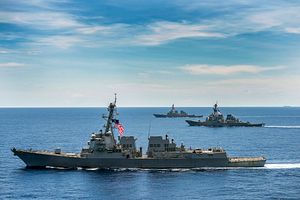On June 17, an Arleigh Burke-class destroyer USS Fitzgerald collided with ACX Crystal, a Philippine-flagged container ship in route to Tokyo Harbor near the east coast of Japan. As a result of the collision, and the ensuing severe damage to Fitzgerald, a ship of the line was taken out of service, careers were lost, considerable taxpayer dollars will be spent on repairs and most significantly, seven U.S. sailors were killed and many more were injured.
Just over two months after the Fitzgerald collision, a second Arleigh Burke-class destroyer, USS John S. McCain, collided with the Alnic MC, a 600-foot chemical and oil vessel sailing under the Libyan flag. According to the Navy, John S. McCain was on its way to a port visit in Singapore after patrolling the South China Sea when the two ships collided east of the Strait of Malacca. The John S. McCain suffered severe damage, once again resulting in flooding and potential loss of life. Five sailors were injured and ten are reportedly missing.
Ninety percent by volume and 85 percent by value of the entire world’s trade is moved by ships. Our founding fathers realized our nation’s vital link to maritime trade and delineated in the Constitution that while Congress has authority to raise an army it is required to provide and maintain a Navy. So it is imperative that each of our ships be prepared to keep the global commons open for world trade – a trade that is vital to our own national security and economic survival.
Over a career spanning nearly 30 years, I was honored to command three separate ships and a squadron of ships; then serve as Chief of Staff for U.S. Naval Surface Forces. My third command was an Arleigh Burke class destroyer, as were the preponderance of ships in Destroyer Squadron (DESRON 23). In those years in command, I always looked for ways to remain focused on what was truly important; and not be sucked into what was often considered career enhancing administrative moves.
The idea of learning rules of the road, damage control, shiphandling and warfighting should seem obvious priorities, but the push to be all things to all people — even a social experiment to some — can leave a combat force focused on efforts that simply don’t matter when it comes to fighting and winning America’s wars.
So before taking command, I turned to my SEAL and aviation brothers and sisters to see how they stay focused. The SEALs had three simple words: “Shoot, Move and Communicate” to prioritize their actions when the situation gets intense. The aviation community uses “Aviate, Navigate, Communicate” to set their priorities. So on May 4, 2012 at the exact moment I took command of DESRON 23, I released General Order Number 1 entitled, “Be Ready To Fight” which specifically articulated priorities at sea for all of the ships under my command. General Order number 1 discussed my priorities at sea and can be found here:
Your priorities at sea (in order) are “Operate, Navigate, Communicate”:
- Operate: Conduct proficient combat operations while ensuring your hull does not touch another or the bottom unless it is the only way you can defend the high value unit or decisively defeat the enemy.
- Navigate: Be where you need to be, when you need to be there.
- Communicate: Up, down and across the chain of command. Always tell the truth; if a SITREP [Situation Report] is required per Instruction, send it; if a fail to sail is required per Instruction, send it; etc. We will report to senior leadership our accurate status so they can make competent decisions based on solid information.
Let’s face it, the maritime environment is complicated. Captains and their crews are ensuring they keep their ships in water that is deep enough to avoid running aground. They are avoiding contact with other ships. They are tracking aircraft, conducting their jobs at sea, watching over the crew, answering the flood of emails, phone calls and video calls from shore, maintaining the countless pieces of complex machinery on their ships, training their crews and keeping them ready to respond to emergencies-fire, flooding, pirates (think Captain Philips) and many more distractions from what should be their top priorities. But if maritime captains prioritize time and effort towards “Operating, Navigating and Communicating” we will have far fewer collisions, groundings and inadvertent crossings into others territorial waters.
Dr. William J. Parker III is Chief Operating Officer at the EastWest Institute. He is the author of Guaranteeing America’s Security in the Twenty-First Century.
































